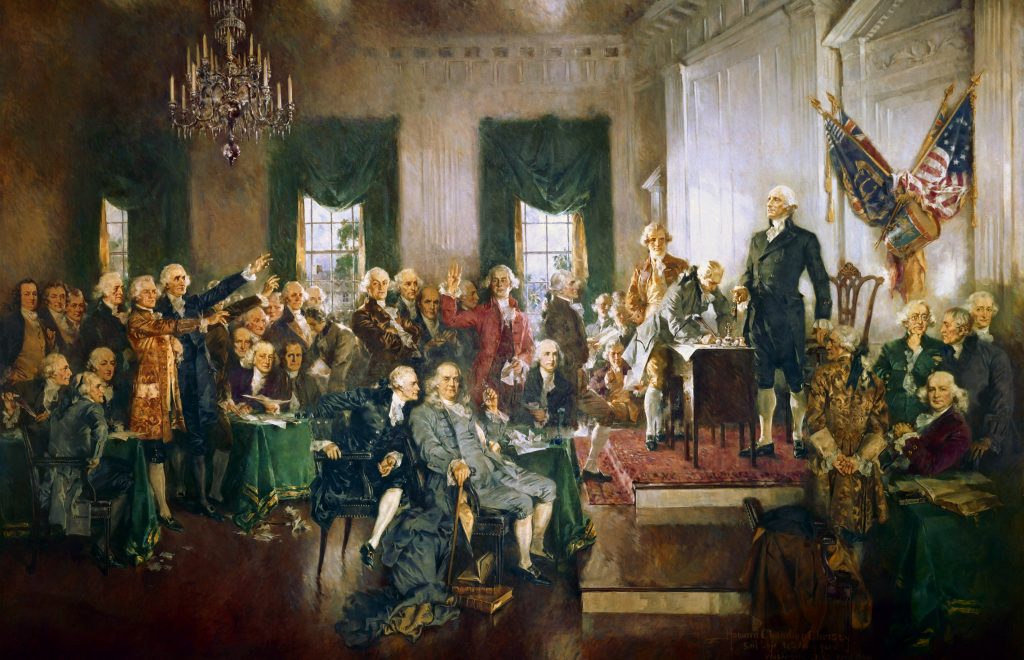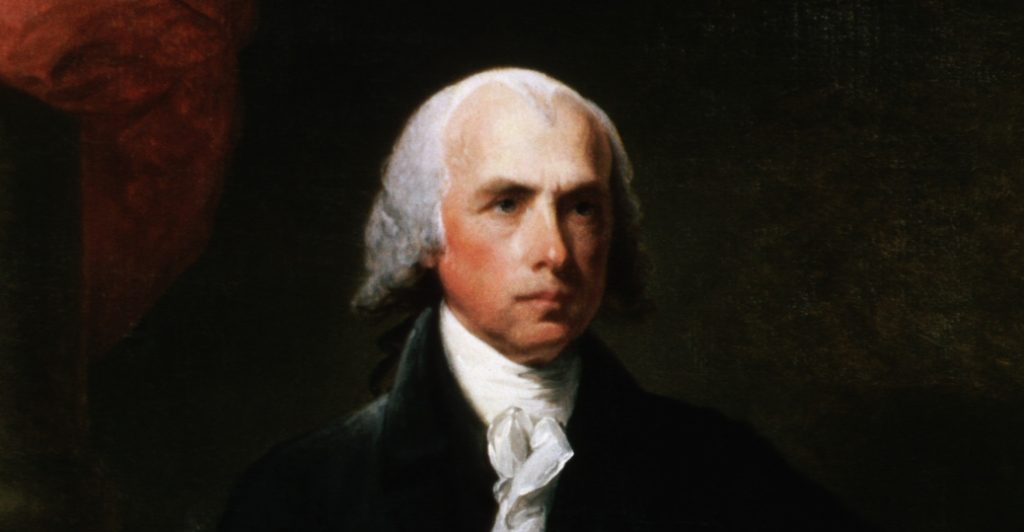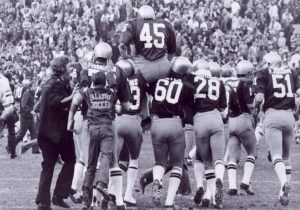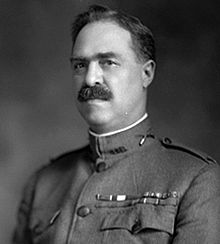There are a number of inconsistencies in the writings of James Madison. Some of those inconsistencies regard states’ rights, the importance of having a bill of rights in the U.S. constitution, and the appropriate size of government.1 One of the inconsistencies that have troubled scholars of Madison is his beliefs on the appropriate extent of popular participation in government. Scholars have addressed this issue in a couple of different ways. Citing his Party Press Essays, some argue that Madison approved of large popular participation.2 Others argue that this type of approval was only on the condition that the majority meet educational, economic, and other standards.3 While Madison’s writings suggest that he could not be anything less than a champion of democracy, his actions at the Constitutional Convention do not uphold this view. Madison sought to strip away the sovereignty of the majority (free, white men) because he distrusted them for many reasons. He also doubted their ability to direct government. Furthermore, he blamed them for the state of the Articles of Confederation and its inability to deal with its own problems efficiently. This combination led him to disapprove of democracy and to oppose the creation of a government that allowed ordinary citizens to wield a meaningful amount of power in government.4
Scholar Neal Reimer correctly argues that Madison did indeed express favor for popular participation in government in his Federalist Essays and Party Press Essays. Madison wrote that, “Public opinion… is the real sovereign in every free [government]” and that citizens should not abide by a rule they do not have any say in.5 But this was not Madison’s complete stance on democracy.
When Madison speaks of popular participation in his article “Public Opinion,” for example, he is not talking about the majority of his own time. He is talking about an enlightened, dispassionate, and interconnected majority: the appropriate majority for a smooth working, just, and free government; that is, someone who embodied the ideals of Republican virtue. Education was not wide-spread at the time, so the majority of Americans in 1787 was not as educated as the majority he supposed in Federalist No. 39. Lacking this education would cause the majority of his day to make decisions in government that were not favorable or in the best interest of the Confederation. The majority of Madison’s time was also not as interconnected as he would have preferred them to be; news and ideas traveled slowly, and the vast and scarcely populated land of North America did not bring people together. This caused a lack of cohesion in ideas, which resulted in a large amount of disagreement that thwarted government from moving forward with reasoned decisions. Also, the disparity between the majority’s and the elite’s access to resources was too great. This would lead to a passion-fueled abuse of power by the majority.
For Madison, education, interconnectedness, cohesion, and economic capacity were important qualities that a majority had to have in order to responsibly wield power in their government.6 These would safeguard against the abuse of governmental power and other vices, as well as create more cohesion among citizens to move government along.7 The majority of his time did not possess these qualities, and for this reason as well as the current state of the Confederation, he argued in favor of the Virginia Plan.

The Virginia Plan sought to bolster the power of the federal government by giving it the power to negate state laws that contradicted with federal laws. This not only limited the sovereignty of the states, but the sovereignty of the people as well. This was a favorable plan to Madison, because he observed that the Articles of Confederation did not give the federal government enough power to protect and govern the Union efficiently. This lack of federal power is what Madison attributed to the failure of the Articles of Confederation.8
The abundance of power that states held was also to blame for the failure of the Articles of Confederation. The states lacked cohesion, and the people from whom they derived their power were to blame. Taking power away from them would make the federal government more efficient, and limiting states’ rights would help accomplish that.9 This is what Madison was most concerned with. It seemed that he understood that the creation of this new constitution would be the solution to this inefficient and divided union.10 Otherwise, preserving states’ and citizens’ power or voice in government would be simply recreating another Articles of Confederation and its problems.
It is acknowledged that Madison was not only skeptical of the majority, but of government officials as well. He wrote in his Federalist No. 39 that democracy would be a safeguard against abuse by government officials.11 And what he meant by democracy in this context was popular participation by the poor white majority of men. But, in the end, Madison had more confidence in elites like himself and government officials that he disregarded this view and advocated for the Virginia Plan. Furthermore, in the same paper, he explicitly suggests that indirect participation would be just as much of a safeguard against abuse by government officials as direct participation would be, writing, “It is sufficient . . . that persons administering [the government] be appointed, either directly or indirectly, by the people.”12 Here Madison shows a willingness to decrease the voice of ordinary citizens in government and not that of government officials.
Aside from his distrust of the majority, Madison believed that the appropriate role of citizens was simply to defend the Constitution.13 Initially, Madison did not favor a Bill of Rights in the Constitution. His understanding of the importance of a Bill of Rights was not in line with the “traditional theory” that the Bill of Rights would protect the majority from the government. Madison would later push for the Bill of Rights for two reasons, both of which do not seek to bolster popular participation.
First, Madison believed that a Bill of Rights would protect the interests of people like him: the elite minority. In a popular government, he believed there was a constant threat that the majority would succumb to their vices. He believed that they would use their influence in government to strip the minority class of their property and liberty. A Bill of Rights would serve as a safeguard for the minority class more than for the majority against government.14
Second, Madison saw an opportunity in the inclusion of a Bill of Rights to further decrease the influence of the majority. If the majority were granted a set of rights to safeguard against government, this would turn into their primary concern. Then, the majority would be inclined not to direct government, but just to protect their rights. The point here is that the Bill of Rights would ultimately serve as a distraction more than a protective measure for the majority.
Madison’s involvement in the creation of the Constitution was not objective. He was subjective and inclined toward advocating for positions that protected, if not furthered, his interests and those of others like him. Madison was a privileged young man growing up; his family was affluent and owned a good deal of land. Liberty and property were some of his main concerns. In a popular government, the majority would be the elite class’ largest threat. There is little to suggest that Madison would be most concerned with the plight of the majority rather than with the interests of the elite. Current events, in addition, made him worry about his property.15
Colleen Sheehan argues that this type of interpretation of Federalist No. 10 is incorrect based on Madison’s “Notes on Government.”16 She argues that his notes suggest he is approving of this large majority’s participation in government and that critics of Madison have taken this paper out of context. But it is Sheehan’s argument that is out of context. Madison wrote these notes on government, as she mentions, in response to theoretical writers’ arguments that say a republic can only work in a small society. This argument does not address the issues of the majority that Madison addressed in his Public Opinion and Federalist no. 39. The issues of the majority that Madison addressed in his Public Opinion, and in Federalist No. 39, was that of whether or not the majority had the capacity to direct government. In these essays, Madison does not have a problem simply with the size of the group participating in government, but with the majority’s capabilities. Madison also addressed whether or not the majority possessed civic virtue.
With all of these factors considered, Madison’s approval of popular participation was indeed conditional, as Gabrielson argues. For the majority to exercise a great deal of participation, they must be enlightened, virtuous, dispassionate, cohesive, and economically up to par. But his majority then was largely uneducated, they were spread out on the vast American land, and the economic gap between the elite and the masses was great. Since the majority of his day did not possess these qualities, they were not capable of directing government. The failure of the Articles of Confederation further supported this view of the majority. For these reasons, he believed that the appropriate extent of popular participation then should be limited to protecting the Constitution instead of directing government.17 This way, the state of the Confederation could be properly addressed. The federal government could better address the problems of the Confederation with more independence from the influence of the majority. Lastly, the rights of the elite would meet a less severe threat from the passions of a majority that was easily susceptible to dissatisfaction and other vices.
- For scholarship on Madison’s inconsistencies, see Neal Riemer, “Republicanism of James Madison,” Political Science Quarterly 69, no. 1 (1954): 45-64, and Teena Gabrielson, “James Madison’s Psychology of Public Opinion,” Political Research Quarterly 62, no. 3 (2009): 431-444. ↵
- Colleen Sheehan, “Madison’s Party Press Essays,” Interpretation: A Journal of Political Philosophy 3, no. 177 (1990): 355-377. ↵
- Teena Gabrielson, “James Madison’s Psychology of Public Opinion,” Political Research Quarterly 62, no. 3 (2009): 431-444. ↵
- For example, see Jack N. Rakove, James Madison and the Creation of the American Republic (New York: HarperCollins Publishers, 1990), 53-69. At the Constitutional Convention, Madison argued in favor of the Virginia Plan that would allow the federal government to overrule any state law that contradicted with federal laws. This measure would limit the voice of citizens in their government. ↵
- James Madison, “Public Opinion,” National Gazette, December 1, 1791. For similar sentiments from Madison, see James Madison, “Federalist no. 39: Conformity of the Plan to Republican Principles,” Independent Journal, January 16, 1788. Madison wrote, “Public opinion… is the real sovereign in every free government.” ↵
- Teena Gabrielson, “James Madison’s Psychology of Public Opinion,” Political Research Quarterly 62, no. 3 (2009): 431-444. Gabrielson makes this point and lists these as the conditions under which Madison would approve of democracy. ↵
- For examples of the vices of the majority, see James Madison, “Federalist no. 10: The Utility of the Union as a Safeguard Against Domestic Faction and Insurrection,” Daily Advertiser, November 22, 1787. ↵
- Jack N. Rakove, Declaring Rights: A Brief History with Documents, (New York: St. Martin’s Press Inc., 1998), 102-103. ↵
- Jack N. Rakove, James Madison and the Creation of the American Republic (New York: HarperCollins Publishers, 1990), 53-69. ↵
- Jack N. Rakove, James Madison and the Creation of the American Republic (New York: HarperCollins Publishers, 1990), 53-69. ↵
- James Madison, “The Federalist No. 39,” Independent Journal, January 16, 1788. ↵
- James Madison, “The Federalist No. 39,” Independent Journal, January 16, 1788. ↵
- Teena Gabrielson, “James Madison’s Psychology of Public Opinion,” Political Research Quarterly 62, no. 3 (2009): 434-435. ↵
- Jack N. Rakove, Declaring Rights: A Brief History with Documents, (New York: St. Martin’s Press Inc., 1998), 100. ↵
- Edward McNall Burns, James Madison: Philosopher of the Constitution (New Brunswick: Rutgers University Press, 1938: 1-69. ↵
- Colleen A. Sheehan, “The Politics of Public Opinion: James Madison’s ‘Notes on Government’,” The William and Mary Quarterly 49, no. 4 (1992): 614-616. ↵
- Teena Gabrielson, “James Madison’s Psychology of Public Opinion,” Political Research Quarterly 62, no. 3 (2009): 434-435. ↵



49 comments
Vianey Centeno
The writing in this essay was excellent. It’s fascinating that President Madison, who was depicted as the founding father who battled so tenaciously for liberty for all, had interests that were not those of the general populace but rather those of himself and the group he belonged to. I can see his fear of the people but I find his choice to establish a government to be lopsided and self-serving.
Kimberly Rivera
Incredible and well written article. I enjoyed reading it as it didn’t proclaim to be on one side rather it allowed me as a reader to decide how i felt about Madison’s Motives. It is an eye opener to see how Madison one of our “Founding Father’s” did not like the idea of democracy or allowing those “unfit” to have any power.
Rafael Portillo
You did a great job with this article. I was really impressed on the amount of information I took in. Madison had some interesting ideals and I can say that because of this article I was able to make more of it. The end notes were very well organized and put together.
Kenneth Cruz
Great job on this article Adziko, you did a fantastic job on keeping true with the history and telling us what James Madison wanted. I like how at the beginning, you mentioned that there were many inconsistencies on what Madison wrote regarding state right and the U.S. Constitution. You managed to clear up those inconsistencies in your article very effectively. This is all useful information to those who might still believe in the inconsistencies.
Dejah Garcia
What a great article! I love how you were able to use imagery in your article in order for the audience to convey this period of time ! I also loved the structure of your article it was super organized and was super easy to read ! You specifically was able to give a background of Madisons mentality. I thought it was super eye opening to read that Madison centered his beliefs around himself and note the people of the country.
Angelo Oliva-Noeggerath
I enjoyed reading the article you’ve published and it was easy to follow along. It was easy know which source you used for information because of the format and the pictures you included help visualize the scene of the event and how it would look. The construction of the end notes made it far easier to understand which sources used and well applied throughout.
Marycarmen Sanchez
You did a great job not criticising Madison, and instead looking through his perspective of things. Thank you for not just picking a side and sticking to it and instead looking at this person from all angles. Before reading this article, I had no idea that James Madison was like this, it was eye-opening and makes me wonder what else I have missed. I liked your sources too and how you incorporated them into your article!
Aaron Onofre
This was a great article, very well written. It is quite interesting that Madison, who was portrayed to be the founding father who fought so hard for democracy for all, had motives that were not people centered but rather centered around himself and the demographic he was apart of. I can understand his fear of the majority (or the mob) but I cannot help but view his decision on creation of government to one-sided and selfish.
Aidan Fitzgerald
You do a great job of providing accurate perspective of James Madison. This article provides significant context to Madison’s firm beliefs about who should have say in government and its clear to see that the “Founding Fathers” were fearful of losing their own power due to giving it to the people of the states who they thought were unworthy or uneducated. Madison wasn’t for democracy, and you make it pretty clear in this article that he was for the power lying within the educated.
Jaedean Leija
Adziko Tsatenawa wrote a good article , I personally didn’t find it interesting for me but Tsatenawa had all the facts or just enough to support his thesis and claims. For me it just felt like a report reading it, I wasn’t to drawn in but that doesn’t mean others felt the same way. Good Article but not for me.